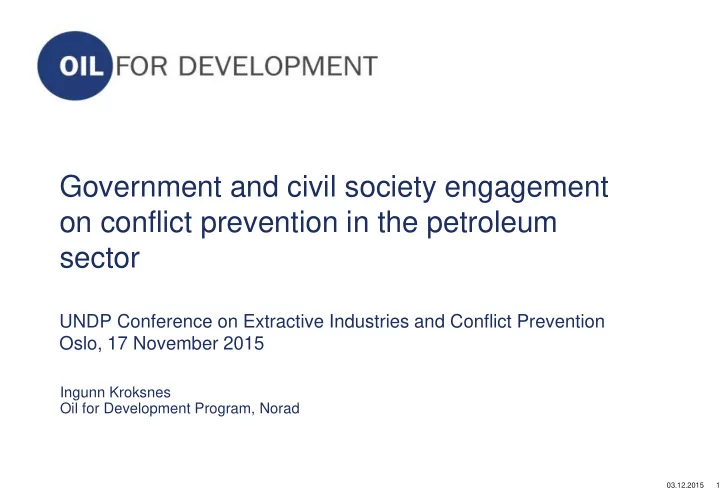

Government and civil society engagement on conflict prevention in the petroleum sector UNDP Conference on Extractive Industries and Conflict Prevention Oslo, 17 November 2015 Ingunn Kroksnes Oil for Development Program, Norad 03.12.2015 1
Avoiding the Resource Curse • Sub-optimal efficiency in extraction; rapid resource depletion • Low capture of public revenues; low savings; “Dutch disease” • Pollution and other environmental breaches • Accidents and injuries during extraction • High corruption; weak institutions • Violent conflicts; human rights breaches; poverty and social inequality 03.12.2015 2
Theory of Change Poverty reduction Promoting economically, environmentally and socially responsible management of petroleum resources Policy makers and regulatory The authorities regulating the Policy makers set goals and define authorities are held accountable petroleum sector carry out their and assign responsibilities for their management of the assigned responsibilities petroleum sector 03.12.2015 3
Main Principles in the OfD program Demand driven 1. Sharing the Norwegian experience – not exporting «Norwegian model» 2. Institutional twinning – peer-to-peer learning 3. Four components: Resource management, revenues, environment, safety 4. Crosscutting issues: Anti-corruption, climate, gender, human rights 5. Long term engagement 6. 03.12.2015 4
Partner countries of 2015 ● Angola ● Myanmar ● Cuba ● Sudan ● Ghana ● South-Sudan ● Iraq ● Tanzania ● Kenya ● Uganda ● Lebanon ● Mozambique
Development co-operation in the petroleum sector inherently represents dilemmas Are increased petroleum revenues actually improving conditions for the poor, or benefitting an elite? Is institutional development good also if the government is authoritarian? When are the negative effects for the environment and affected populations too large? Is Norway sharing the right experiences? How can we operationalize the “resource curse” discourse? 03.12.2015 6
Can OfD contribute to conflict prevention or conflict management? ● Understanding the country context: Conflict risk analysis and program design (do no harm) ● Promoting transparency and accountability within program components ● Environmental and social impact assessments ● Promoting broad stakeholder engagement, including local communities, vulnerable groups ● Strengthening civil society and public oversight institutions ● Creating arenas for dialogue and cooperation through program activities ● Early involvement However: ● Technical assistance has limited impact without political will ● Broader Norwegian/international effort necessary - joining forces and scaling up diplomacy 03.12.2015 7
Recommend
More recommend